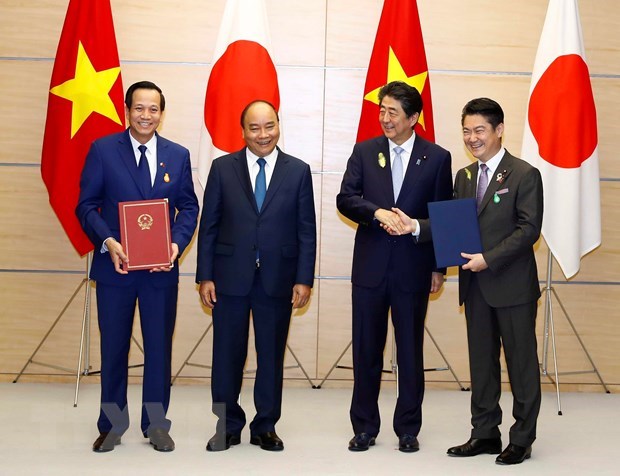Viet Nam, Japan agree on employing specific skilled workers
Viet Nam’s Ministry of Labour, Invalids and Social Affairs (MOLISA) and four Japanese agencies on July 1 signed a memorandum of cooperation (MoC) on sending specific skilled workers of Viet Nam to work in Japan.
 |
| At the signing ceremony (Photo: VNA) |
Prime Minister Nguyen Xuan Phuc and his Japanese counterpart Shinzo Abe attended the signing ceremony of the MoC, inked by representatives of the MOLISA and the Ministry of Justice, Ministry of Foreign Affairs, Ministry of Health, Labour and Welfare, and the National Police Agency of Japan.
The MoC is a fundamental legal framework for Japan to receive Vietnamese workers under Japan’s “specific skilled workers” programme.
Under the deal, the Japanese side will only accept specific skilled workers from Viet Nam after they complete necessary procedures in line with the law of Viet Nam, which enables them to enter a recognised list of the MOLISA.
The workers must be sent from organisations and businesses licenced by the MOLISA, along with Vietnamese nationals residing in Japan who are directly recruited by Japanese employers.
The MoC bans unqualified Vietnamese residing in Japan to take part in skill testing activities in Japan.
The Japanese side will apply suitable measures to prevent Vietnamese guest students to change their residential status to work in Japan, said the MoC.
Under the deal, specific skilled workers in Japan will enjoy benefits in line with the country’s immigration law, labour law and other related regulations. At the same time, they will have other rights related to Japanese and other skills training fees, travel allowance, including air tickets to Viet Nam after ending the contract.
Japan will not receive Vietnamese workers in banned regions or sectors, it said.
Through the MoC, Viet Nam and Japan agreed to share information of agencies and organisations authorised for sending or receiving workers to work in Japan, while coordinating with each other in management and supervision activities to prevent violations.
(Source: VNA)